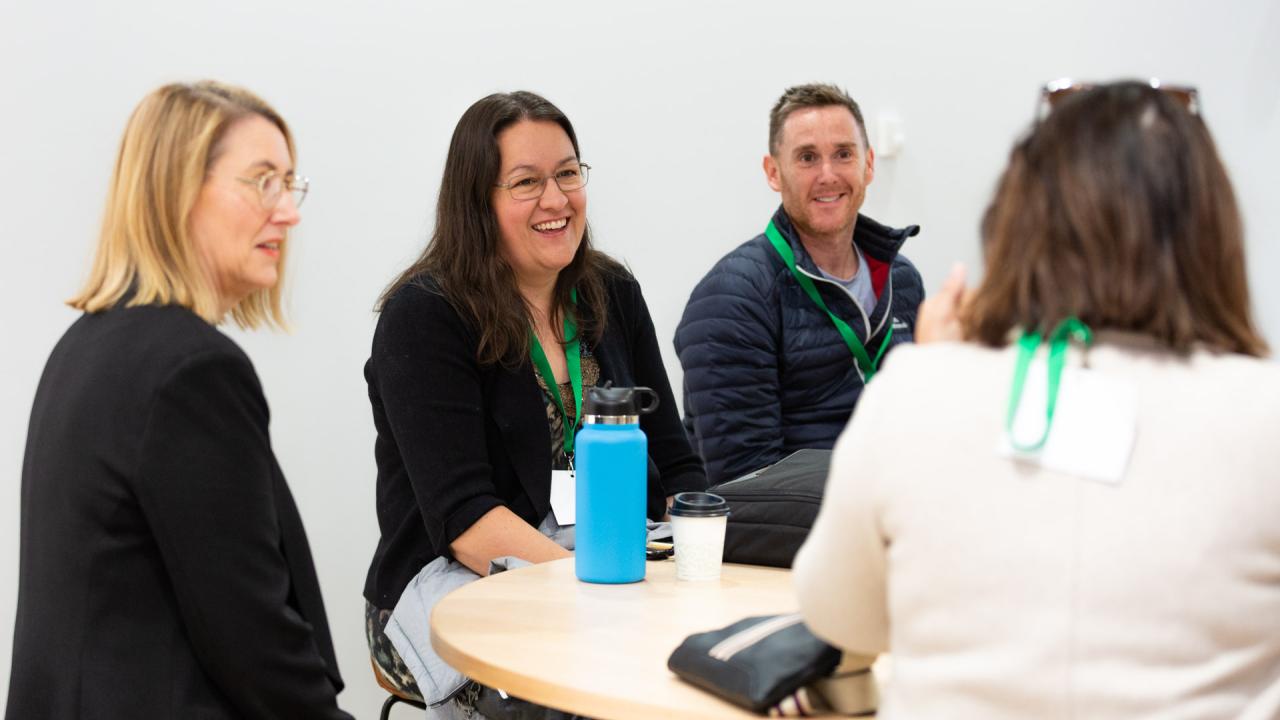21 May 2020
Unpacking a Student’s Point of Need - Part C

Feedback and Formative Assessment
This webinar is part of a series designed by teachers for teachers during the period of remote teaching and learning. It focuses on reading for Foundation to Year 2.
Discover how to apply formative assessment strategies linked to learning intentions and the Victorian Curriculum F-10 achievement standards to progress reading learning remotely.
Gain insights from the experience of teachers at Hamlyn Banks Primary School with a detailed look at strategies and structures used to monitor students' reading progress.
This resource was developed by the former Bastow Institute of Educational Leadership.
Length: 12:06

Download

Transcript
Welcome to the third session in the series Unpacking Student Point of Need. The previous two sessions discussed knowing our students and establishing reading goals. In this final presentation of reading F to 2 Unpacking Student Point of Need we will be focusing on using feedback and formative assessment to move students along in their reading development. We will be using a school case study to offer one example of how a school has structured their teaching and learning units so teachers can continue to assess their students and give powerful feedback to advance their learning. The pedagogical model remains the same whether we are teaching in the classroom or remotely. We put our students at the centre of the learning and use their individual point of need to plan for their teaching and learning.
In this session we will focus on FISO Essential Element 1, having a documented curriculum plan, assessment and shared pedagogical approaches. The emphasis of this presentation will be on gathering formative assessment and giving feedback to guide our students' reading development. Formative assessment provides the feedback to enable teacher and student to answer three key questions. What is to be learned? How is learning progressing? What will be learned next?
It is continuous, focused on improvement and monitored constantly by teacher and student. For formative assessment to be useful, learning intentions, the Victorian Curriculum F-10 Achievement Standards and forms of assessment need to be closely linked. The learning program is designed to scaffold and stretch students, enabling them to achieve their goals. The learning program is differentiated. It is built and modified around the individual learning needs of the students. During this presentation, we will learn how Hamlyn Banks Primary School teachers continue to follow all of these aspects of formative assessment even though they are not in the same physical space as their students.
The principles of effective feedback remain the same even when teachers and students are not in the same room. Effective feedback focuses on the quality of the learner's work product and/or processes, motivates and challenges the learner to further develop their knowledge and skills, recognises what the student has done well and identifies what has been misunderstood or not understood, focuses on the quality of the work and is specific, is directly linked to the learning intentions and success criteria, may be spoken, a gesture or formalised in writing. Remote teaching at Hamlyn Banks Primary School - a case study. Hamlyn Banks Primary School is a P to 6 coeducational school located in Hamlyn Heights in the Barwon South Western region. Hamlyn Banks Primary School has around 390 student. How are teachers at Hamlyn Banks Primary School monitoring their students' reading progress remotely? Teachers are time tabled to meet with their professional learning team and a curriculum coach to plan a teaching and learning unit of work which is made available for families each week. The plans are designed to be accessible for all students and are available via Compass or hard copies can be collected from the school if necessary. Each plan outlines daily essential work. The weekly plan also includes reading activities that families can complete with their children during the week at their own pace.
Each professional learning team, along with their curriculum coach, plans units of work that are engaging and are able to be accomplished with minimal resources in the home setting. All planning is guided by the Victorian curriculum and student data and is able to be followed up during weekly teacher and student Webex conferences. Teachers' weeks are structured to facilitate teaching and learning as closely as possible to FISO Essential Element 1, having a documented curriculum plan, assessment and shared pedagogical approaches.
Daily whole-class meetings allow teachers and students to interact with each other, check in on students' social and emotional wellbeing, and to teach explicitly. Weekly individual conferences allow teachers and students to address explicit learning needs and monitor reading, writing and maths goal progression. Students and their families complete a weekly timetable that allows for flexibility of timing when learning tasks are completed. Specialist classes are attended via Webex, as are daily class meetings and individual conferences. Whole-class meetings include explicit teaching of reading strategies.
The planning of these mini lessons are driven by student need, observed by the teacher during reading conferences. Individual conferences are goal based, differentiated, curriculum aligned, planned, used for continuous assessment, drive future planning, and are feedback driven. Teachers and students confer each week. The purpose of each conference includes maintaining teacher-student relationships, checking in to see how the student is managing the learning tasks, and following the formative assessment questioning process in regard to the student's goals. What is being learned, how is the student learning it, and what will be learned next? What are we paying attention to in our reading conferences?
Teachers are looking and listening for reading enjoyment, reading purpose, concepts about print, oral language and vocabulary, connection to the text, decoding skills and accuracy, comprehension skills, fluency skills, and self-monitoring. What types of reading formative assessment can teachers use during an individual conference? Teachers can use running records, observational notes, videos, checklists, questionnaires, and simple rubrics to gather formative assessment on their students' reading behaviour. What goal follow-up reading conference questions are useful to move the learning forward? Can you show me some places where you practised your goal? How is your goal practice going? What has been tricky for you in trying to achieve this goal?
Intentional and authentic reading teaching and learning continues for Hamlyn Banks Primary School students. They are engaged in reading, they have some choice about what they read, they are receiving explicit instruction about what, why and how readers read. Teachers are monitoring, assessing and supporting reader growth and students have the opportunity to discuss and respond to their reading. How do Hamlyn Banks Primary School teachers feel about their remote reading program?
The things that are working well include uninterrupted explicit teaching, knowing students' abilities very accurately, parents are given the opportunity to observe how teachers teach so they can reinforce strategies at home, and there continues to be explicit goal setting. Using online books as big books for modelled reading, stopping and thinking aloud, or asking for students to discuss a strategy they would use, using online books and doing shared reading, explaining/explicit teaching of reading strategies with visuals, sharing a screen during learning conferences and asking students to read the material.
This is an example of how the teachers and students in one school are continuing to use formative assessment and feedback to facilitate reading growth. However, every school is unique and will have a unique set of conditions that will influence the way their teaching and learning programs are organised and facilitated. When we get down to the basics, what do we all need to consider when teaching our emergent readers?
We need to foster a love of reading and words, facilitate learning to read and reading to learn, know our student's point of need, refer to the Victorian Curriculum and Literacy Teaching Toolkit for guidance, gather and record formative assessment in a variety of ways, give feedback that is specific and related to the reader's goals. We can listen to a student read or read to a student and ask. Did you notice a pattern? Tell me what happened to the little egg? What do you think this book will be about? What did Mole learn? Describe your favourite character. What type of text is this? How do you know? What differences do you notice between poetry and prose? Can you make any connections between these texts? Can you work out the rhyming pattern? What do you think is the author's main message? Can you retell the main events in this story in the correct sequence?
Formative assessment and feedback facilitate high-impact learning. How this is achieved will look different from school to school, teacher to teacher and student to student just as it always has and always will. The people who have collaborated on this presentation are Amy Duckworth, Carol Hodgson, Cathy Buchanan-Hagen, Nieta Manser, Ben Hawthorn and Cathie Sutton. Many thanks for listening to the recordings to support teachers unpack a student's point of need. If you would like to explore these ideas further, we welcome you to register for one of the corresponding webinars on May 14th or May 27th via the registration link.
Discover more resources
This webinar examines how you can identify the next point of learning for your students, with a focus on identifying what you know and what you need to find out. Understand how to establish achievable learning goals and how to monitor progress.
Learn more

This webinar examines how you can identify the next point of learning for your students, with a focus on identifying what you know and what you need to find out.



